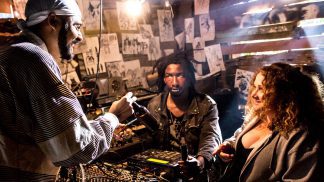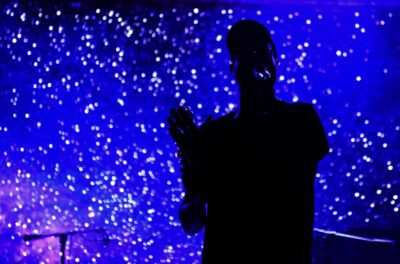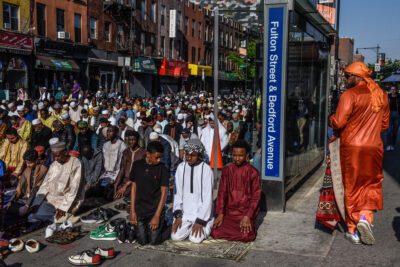Patti Cake$ Feels Fresh Until It Doesn’t
Patti Cake$ should not feel fresh. Though it stars talented up-and-comer Danielle MacDonald, is a first-time feature from writer-director Geremy Jasper, and focuses on a title character with a bigger build not typically seen in mainstream crowd-pleasers, it pretty much is just that—a mainstream crowd-pleaser, albeit with some gritty New Jersey mise-en-scene.
A lot of the movie’s story comes from the already-worn playbook of 8 Mile: Like that movie’s fictionalized version of Eminem, Patti is poor, looking for extra shifts at a dead-end job, living with an alcoholic mother (comic and singer Bridget Everett), and a talented freestyle rapper facing both encouragement from close friends and discouragement from a world at large that has written her off. She even engages in a rap-battle at one point, with both the pleasures and clichés of that set-up intact.
Yet for a while—roughly the first half of its 110 minutes—Patti Cake$ has enough energy to simulate novelty. Part of the reason may be that while plenty of hip-hop stars and rappers have started strong and/or successful acting careers, there haven’t been that many contemporary movies about fictional rappers. There are biopics, to be sure, like 2015’s Straight Outta Compton and this past June’s All Eyez on Me. But there don’t seem to be as many fictional movie rappers that aren’t full-on parodies; think of the rap equivalent of mid-level rock bands created by Almost Famous or That Thing You Do! It’s hard not to recall Hustle and Flow and 8 Mile during Patti Cake$ because hip-hop culture’s prominence within pop music doesn’t seem to be echoed in the struggling-musician movie.

(From L-R): Siddharth Dhananjay, Mamoudou Athie and Danielle Macdonald in the film PATTI CAKE$.
Photo by Jeong Park. © 2017 Twentieth Century Fox Film Corporation All Rights Reserved
Patti Cake$ pays attention to the mechanics of making music without much money: the way that Patti and her best friend and creative partner Jheri (Siddharth Dhananjay) go to local shows at the VFW, scrape by for studio time at a makeshift facility in the basement of a pet store (called “Pet Soundz,” natch), and wind up incorporating that hoariest of broad-comic standbys, the rapping grandma (in this case, it’s really a sampled grandma, and she’s played by Cathy Moriarty, so fair enough). The movie also resonates as a specifically lower-class New Jersey story, full of late-night diner trips and longing looks across the river to Manhattan.
Indeed, a Springsteen song plays over an introductory montage of Patti’s baby photos and New Jersey scenery. This would be on-the-nose for the rock-and-roll equivalent and sounds more eclectic on a mostly-rap soundtrack—a duality that itself functions as something of a tell. As a white mostly-indie-rocker with only the most cursory knowledge of hip-hop, I still found Patti Cake$ pretty accessible, Springsteen reference point and all—and maybe that’s a problem. Though their production is a little different, Patti’s songs still reminded me a little of Beastie Boys-ish Long Islanders Northern State: clever, catchy, and so likable that I felt a little uneasy.
Patti does get called out, at one point, for appropriating culture that’s not hers to fuck with, by a character with plenty of authority. But the movie ultimately concludes that Patti has something to say and rap is how she says it, and leaves it at that. Her act, called PBNJ, is racially diverse, at least, especially without the grandma on stage. That’s not an invalid stance, but the movie keeps pushing—not belaboring racial politics so much as pledging its allegiance to formula and closure.
When (feel-good spoilers follow) PBNJ plays at a new-artist showcase, Jasper insists that a brand-new, less tested song from a white rapper would go over well with a mostly black crowd. It feels especially galling because the song is freighted with providing full emotional catharsis for two major characters and is also supposed to represent artistic growth from Patti’s earlier material. Like a lot of movies about other art forms, it conflates artistic expression with “honest” autobiography, demystifying the creative process into people writing down stuff that happened to them. (This may be why the movie doesn’t feel like Patti is appropriating anything; she’s rapping about her life, how can she be knocking anyone off?) Making music is not inherently cinematic, especially in the downtime between fully-formed performances. Patti Cake$, like so many struggling-musician movies before it, fills that space with a lot of melodrama.
You might also like 



















